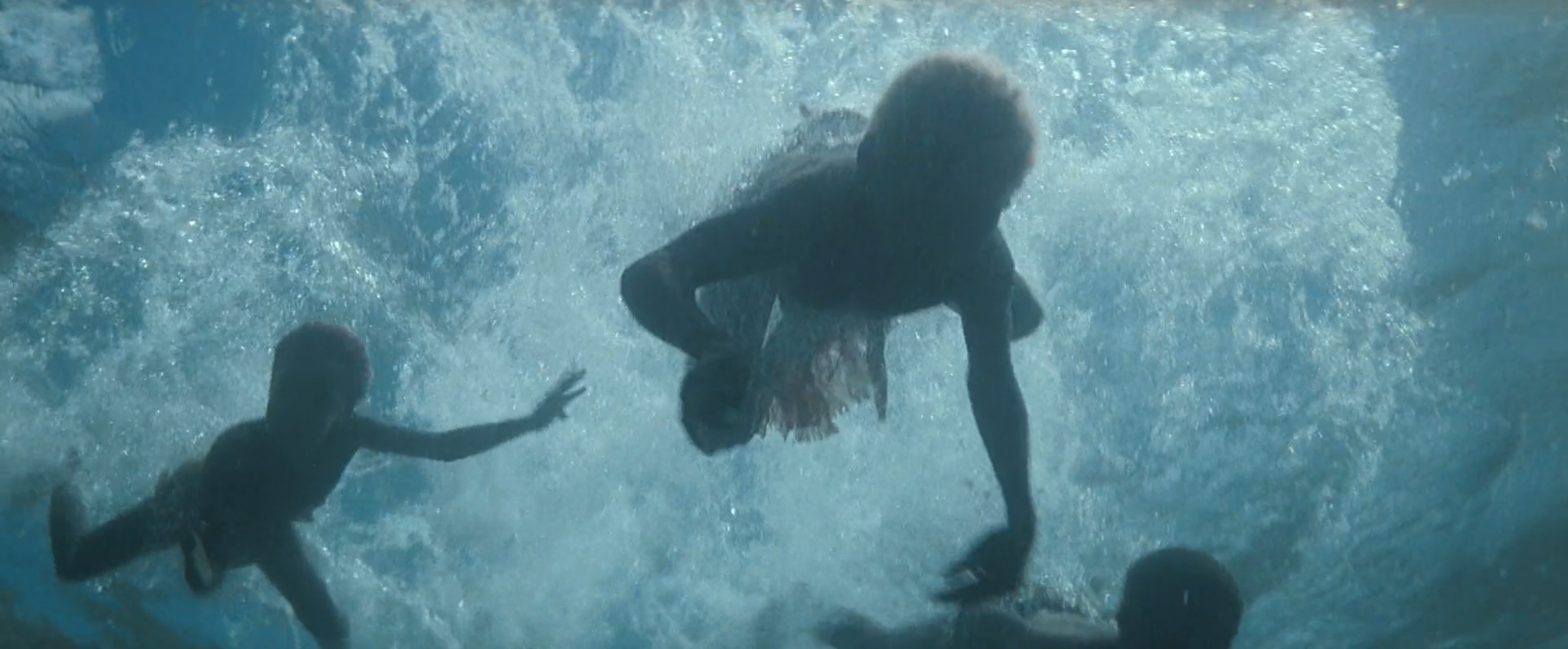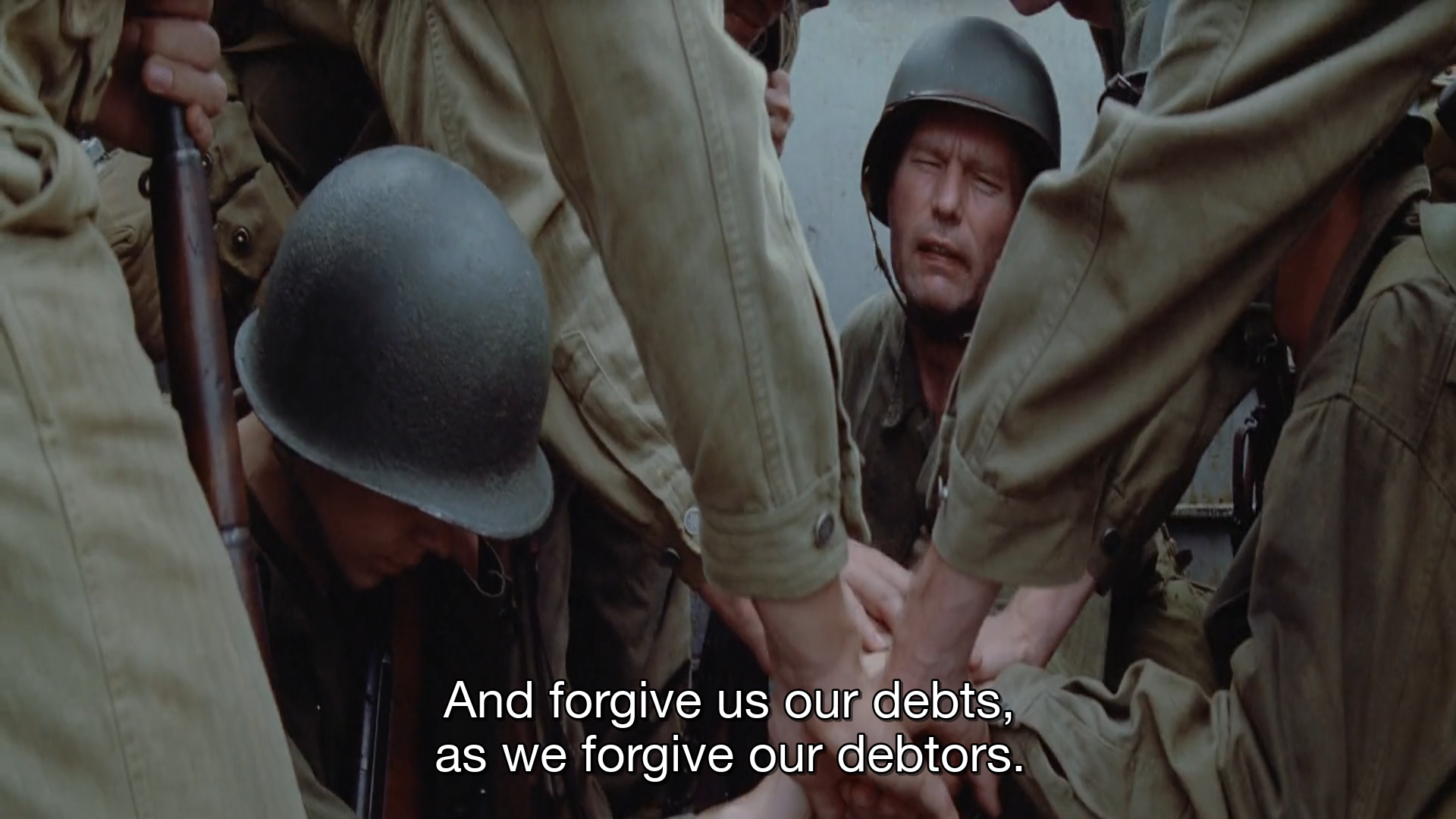Have you watched Terence Malick's masterpiece To The Thin Red Line?


 suspendedreason
suspendedreason“What’s this war at the heart of nature? Why does nature vie with itself? The land contend with the sea? Is there an avenging power in nature? Not one power but two?”
While the narrator speaks, we see light streaming through gaps in the canopy leaves. A vine candy-canes a treetrunk like a snake, parasitically using its cellulose as backbone structure. This is the tree of life, the great tree.
Five boys are passing stones rhythmically in a circle, synchronizing their bodies. A couple holds hands.
"I couldn't find anything beautiful or uplifting about her [my mother] going back to God. I hear people talking about immortality, but I ain't seen it. I wondered how it'd be when I died. To know this breath, now, was the last you was ever gonna draw. I just hope I can meet it the same way she did, with the same... calm. Cause that's where it's hidden. The immortality."
Flashback now to white-laced breast-plates, floral designs. Two birds in a cage. The wallpaper is purple flowers, green leaves and a cream background. A basin of water. The nature we domesticate, adorn ourselves with, keep with us, inside us. The same woven netting that lines the songbird's cage, keeping them trapped, holds together the young girl's white lace.
 In reply tosuspendedreason⬆:suspendedreason
In reply tosuspendedreason⬆:suspendedreason
David Graeber has joined the chat.
 In reply tosuspendedreason⬆:suspendedreason
In reply tosuspendedreason⬆:suspendedreasonBeen on a bit of a war movie kick this week, and try to start talking about a shared interest in many of them. We'll use (Ed Burns & David Simon’s) Generation Kill and Malick’s Thin Red Line as our case studies. This shared interest/emphasis is the perspective "on the ground," among the men and battle, and the tricky management of boots-on-the-ground intel versus officer-in-headquarters-giving orders. Why is this so common in war films? Likely because so many of the accounts come from junior officers and embedded journalists—viewers are encouraged to sympathize with the POV of the teller. Top-down vs. bottom-up: the embedded lieutenant or whoever is saying sitting in the trenches with their men, arguing over their phone with their CO: "this assault is suicide, why are my men getting killed over some random patch of soil, we can go around, is this really necessary or just orders." And the CO is damning his junior officer to all hell, saying he has no stomach for war, he doesn't understand the "bigger picture," etc. There’s this constant theme of “distant management,” which is what I think Seeing Like A State is about as much as it is about “overhaulism.”
I may make a mega-thread about distant management, but I can start in here. Let's say the SLAS argument has two components, overhaulism and distant management. The first is about revolutions, design, imposed plans.
overhaulism (n): related to Chesterton’s fence, Hayek’s “fatal conceit,” Christopher Alexander and James Scott’s “high modernism,” Taleb’s “modernistic intellectualism,” and John Gall’s “systemism.” A belief in the power of individuals’ synchronous reasoning & intelligence to intervene in a complex system; correspondingly, an attitude of bearishness toward evolved solutions. [...] Overhaulism in architecture and design are fundamental aspects of modernism, for better and worse. Behavioral econ’s attempt to overhaul the evolved wisdom of local fields (e.g. basketball and hot-hand fallacy) was an example of the failures of overhaulism. There are sometimes advantages to reason- and intelligence-based overhauls, specifically in getting us over valleys and onto higher local maxima, but it is weakest in dealing with systems of complexity outside our current intellectual grasp (human psychology and visual beauty, in the case of architecture and design; human performance, in the case of hot-hand; causality and nth-degree effects in the case of utilitarianisms).
Distant management is more like an inevitable but deadly quality of large organizations, global economies, and the Internet. Observers from far away attempt to regulate and guide the actions of individuals embedded in deep local contexts. In some cases, this outside view provides clarity, breaks up incest and self-delusion, etc. In other cases, there is a deadly ignorance of the actual, real conditions, which is papered-over by idealism and "education." I'm sure there's a rival term for this, and am down to adopt any people propose, but I gotta use what I got.
 In reply tosuspendedreason⬆:suspendedreason
In reply tosuspendedreason⬆:suspendedreason"It's the oldest trick in the book. Officers call in danger-close fire missions in order to win medals." Opticratics, this is class Burns & Simon stuff, "drugs on the table" is more or less their short-hand for big political performances that don't reflect real progress or efficacy.
This scene is one of the final in the entire mini series, and I think it's meant as a serious challenge to what we've seen up to that point. Sorting good from bad men is a genuinely hard task unless you're constantly alongside an individual as they make decisions. This is what value learning is getting at. Otherwise you're leaning on pretty gameable, untrustworthy information—surrogate metrics, individuals passing on falsified or exaggerated reports, strategic complaints, etc.
here are clearly good, competent officers and bad, incompetent officers. But how does command tell which from which? The competent officers can be insubordinate, they lie to their COs, they refuse orders. Sure, the situation on the ground was bad, or they lied to protect their men, but how is the colonel to know that these officers’ heart is good? He can’t from distant managing. And hierarchy, large organizations, seem to necessitate distant management, what James Scott calls the synoptic view. What’s a guy (read: officer) to do?